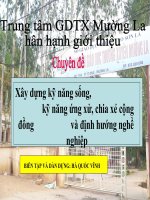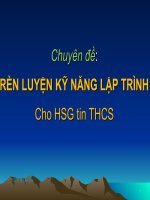Chuyên đề rèn luyện kỹ năng đọc hiểu tiếng Anh (Buổi 1)
Bạn đang xem bản rút gọn của tài liệu. Xem và tải ngay bản đầy đủ của tài liệu tại đây (658.34 KB, 3 trang )
Like và theo dõi Fanpage tại: />
CHUYÊN ĐỀ
RÈN LUYỆN KỸ NĂNG ĐỌC HIỂU TIẾNG ANH
(Buổi 1)
Read the following passage and choose the correct word or phrase that best fits
each of the numbered blanks.
A trend that has emerged recently is the sharing of childcare (1)_______ between
husband and wife. Young couples will try to arrange their work schedules so that
they work opposite hours or shifts in order that one parent is always home with
the children. Since childcare is expensive, this saves money for the young couple
trying to establish themselves and provide a secure environment for the family.
Husband and wife may also share household chores. Some fathers are just as
capable as mothers at cooking dinner, changing and bathing the baby, and doing
the laundry.
In some cases, the woman’s salary is for family (2)_______ and the father
becomes the “househusband.” These cases are still fairly rare. One positive trend,
however, is that fathers seem to be spending more time with their children. In a
recent survey, 41% of the children sampled said they spend equal time with their
mothers and fathers. “This is one of our most significant cultural changes,” says Dr.
Leon Hoffman, who co-directs the Parent Child Center at the New York
Psychoanalytic Society. In practice, for over 30 years, Hoffman has found “a very
dramatic difference in the involvement of the father in everything from care-taking
to general decision (3)_______ around kids' lives.”
Another factor has recently been added to the childcare formula. The number of
people who work from home nearly full-time rose 23% from the last decade. The
(4)_______ of technology - computers, faxes, teleconferencing - has made it easier for
at-home workers to be constantly in touch. Will this new flexibility in the
workforce bring a positive change for the (5)_______ of children? Only time will tell.
Question 1: A. abilities
B. techniques
C. possibilities
D. responsibilities
Question 2: A. expenses
B. payment
C. fees
D. fares
Question 3: A. making
B. giving
C. creating
D. holding
Question 4: A. access
B. accessibility
C. accessible
D. accessibly
Question 5: A. well-being
B. interests
C. comfort
D. security
Trang 1
Like và theo dõi Fanpage tại: />
Read the following passage and choose the correct answer to each of the
questions.
Quite different from storm surges are the giant sea waves called tsunamis,
which derive their name from the Japanese expression for “high water in a
harbour”. These waves are also referred to by the general public as tidal waves,
although they have relatively little to do with tides. Scientists often referred to
them as seismic sea waves, far more appropriate in that they do result from
undersea seismic activity.
Tsunamis are caused when the sea bottom suddenly moves, during an
underwater earthquake or volcano for example, and the water above the moving
earth is suddenly displaced. This sudden shift of water sets off a series of waves.
These waves can travel great distances at speeds close to 700 kilometres per hour.
In the open ocean, tsunamis have little noticeable amplitude, often no more than
one or two meters. It is when they hit the shallow waters near the coast that they
increase in height, possibly up to 40 metres.
Tsunamis often occur in the Pacific because the Pacific is an area of heavy
seismic activity. Two areas of the Pacific well accustomed to the threat of tsunamis
are Japan and Hawaii. Because the seismic activity that causes tsunamis in Japan
often occurs on the ocean bottom quite close to the islands, the tsunamis that hit
Japan often come with little warning and can, therefore, prove disastrous. Most of
the tsunamis that hit the Hawaiian Islands, however, originate thousands of miles
away near the coast of Alaska, so these tsunamis have a much greater distance to
travel and the inhabitants of Hawaii generally have time for warning of their
imminent arrival.
Tsunamis are certainly not limited to Japan and Hawaii. In 1755, Europe
experienced a calamitous tsunami, when movement along the fault lines near the
Azores caused a massive tsunami to sweep onto the Portuguese coast and flood the
heavily populated area around Lisbon. The greatest tsunami on record occurred on
the other side of the world in 1883 when the Krakatoa volcano underwent a
massive explosion, sending waves more than 30 metres high onto nearby
Indonesian islands; the tsunami from this volcano actually traveled around the
world and was witnessed as far away as the English Channel.
Question 1: It can be inferred from the passage that tsunamis _____.
A. generally reach heights greater than 40 metres
B. cause severe damage in the middle of the ocean
C. are often identified by ships on the ocean
D. are far more dangerous on the coast than in the open ocean
Trang 2
Like và theo dõi Fanpage tại: />
Question 2: From the expression “on record”, it can be inferred that the tsunami
that accompanied the Krakatoa volcano _____.
A. was filmed as it was happening
in Lisbon
B. was not as strong as the tsunami
C. might not be the greatest tsunami ever D. occurred before efficient
records were kept
Question 3: According to the passage, all of the following are true about tidal
waves EXCEPT that _____.
A. they are the same as tsunamis
B. this terminology is not used by the scientific community
C. they are caused by sudden changes in high and low tides
D. they refer to the same phenomenon as seismic sea waves
Question 4: The paragraph preceding this passage most probably discusses _____.
A. tides
B. underwater earthquakes
C. tidal waves
D. storm surges
Question 5: A main difference between tsunamis in Japan and in Hawaii is that
tsunamis in Japan are more likely to _____.
A. be less of a problem
B. originate in Alaska
C. come from greater distances
D. arrive without warning
Question 6: The word “displaced” is closest in meaning to _____.
A. not pleased
B. located
C. moved
D. filtered
Question 7: A “calamitous” tsunami is one that is _____.
A. expected
B. extremely calm
C. at fault
D. disastrous
Question 8: The passage suggests that the tsunami resulting from the Krakatoa
volcano _____.
A. caused volcanic explosions in the English Channel
B. was unobserved outside of the Indonesian islands
C. was far more destructive close to the source than far away
D. resulted in little damage
Trang 3









